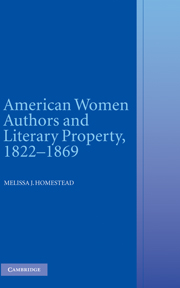Book contents
- Frontmatter
- Contents
- Preface: “Imperfect Title”
- Acknowledgments
- Introduction: “Lady-Writers” and “Copyright, Authors, and Authorship” in Nineteenth-Century America
- 1 Authors, Wives, Slaves: Coverture, Copyright, and Authorial Dispossession, 1831–1869
- 2 “Suited to the Market”: Catharine Sedgwick, Female Authorship, and the Literary Property Debates, 1822–1842
- 3 “When I Can Read My Title Clear”: Harriet Beecher Stowe and the Stowe v. Thomas Copyright Infringement Case (1853)
- 4 “Every body sees the theft”: Fanny Fern and Periodical Reprinting in the 1850s
- 5 A “Rank Rebel” Lady and Her Literary Property: Augusta Jane Evans and Copyright, the Civil War and After, 1861–1868
- Epilogue: Belford v. Scribner (1892) and the Ghost of Mary Virginia Terhune's Phemie's Temptation (1869); or, The Lessons of the “Lady-Writers” of the 1820s through the 1860s for Literary History and Twenty-First-Century Copyright Law
- Index
3 - “When I Can Read My Title Clear”: Harriet Beecher Stowe and the Stowe v. Thomas Copyright Infringement Case (1853)
Published online by Cambridge University Press: 24 July 2009
- Frontmatter
- Contents
- Preface: “Imperfect Title”
- Acknowledgments
- Introduction: “Lady-Writers” and “Copyright, Authors, and Authorship” in Nineteenth-Century America
- 1 Authors, Wives, Slaves: Coverture, Copyright, and Authorial Dispossession, 1831–1869
- 2 “Suited to the Market”: Catharine Sedgwick, Female Authorship, and the Literary Property Debates, 1822–1842
- 3 “When I Can Read My Title Clear”: Harriet Beecher Stowe and the Stowe v. Thomas Copyright Infringement Case (1853)
- 4 “Every body sees the theft”: Fanny Fern and Periodical Reprinting in the 1850s
- 5 A “Rank Rebel” Lady and Her Literary Property: Augusta Jane Evans and Copyright, the Civil War and After, 1861–1868
- Epilogue: Belford v. Scribner (1892) and the Ghost of Mary Virginia Terhune's Phemie's Temptation (1869); or, The Lessons of the “Lady-Writers” of the 1820s through the 1860s for Literary History and Twenty-First-Century Copyright Law
- Index
Summary
In 1853, Harriet Beecher Stowe filed a copyright suit against F. W. Thomas, a Philadelphia publisher who had published an unauthorized German translation of Uncle Tom's Cabin in his newspaper, Die Freie Presse. Stowe brought suit in the federal circuit court in Philadelphia, thus ironically placing her claim in the hands of Justice Robert Grier, a notable enforcer of slave-owners' interests under the Fugitive Slave Law. Grier found that Stowe's property rights in her novelistic plea for resistance to the Fugitive Slave Law were very narrow and that she could not prevent Thomas from publishing a translation without her authorization. In the conclusion to the court's opinion, Grier writes:
By the publication of Mrs. Stowe's book, the creations of the genius and imagination of the author have become as much public property as those of Homer or Cervantes. Uncle Tom and Topsy are as much publici juris [public property] as Don Quixote and Sancho Panza. All her conceptions and inventions may be used and abused by imitators, play-rights and poetasters. They are no longer her own – those who have purchased her book, may clothe them in English doggerel, in German or Chinese prose. Her absolute dominion and property in the creations of her genius and imagination have been voluntarily relinquished. All that now remains is the copyright of her book; the exclusive right to print, reprint and vend it, and those only can be called infringers of her rights, or pirates of her property, who are guilty of printing, publishing, importing or vending without her license “copies of her book.” A translation may, in loose phraseology, be called a transcript or copy of her thoughts or conceptions, but in no correct sense can it be called a copy of her book.
- Type
- Chapter
- Information
- American Women Authors and Literary Property, 1822–1869 , pp. 105 - 149Publisher: Cambridge University PressPrint publication year: 2005



